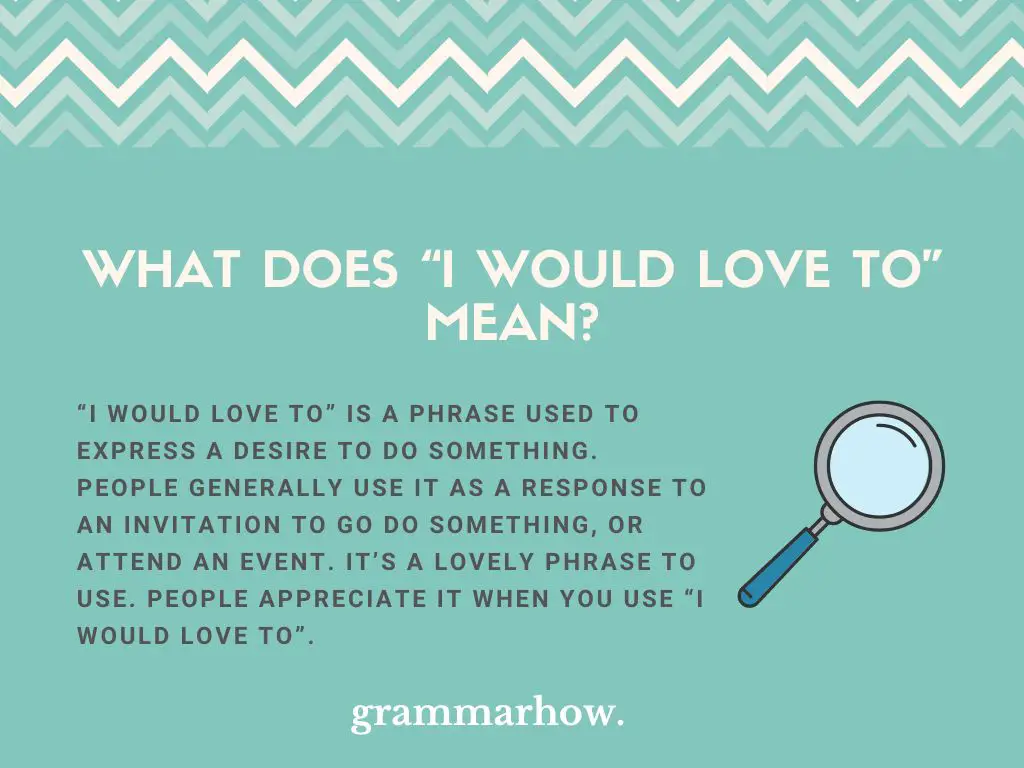“I would love to” is the sort of phrase that people use a lot. You’ll spot this phrase in plenty of different conversations. What does this phrase actually mean? Is it “I would love to” or “I would love too”? This article will answer these questions and more.
What Does “I Would Love To” Mean?
“I would love to” is a phrase used to express a desire to do something. People generally use it as a response to an invitation to go do something, or attend an event. It’s a lovely phrase to use. People appreciate it when you use “I would love to”.

You can use “I would love to” to express a desire or a wish that you have. As a response to someone, it can mean “Yes, let’s do this”.
However, if followed with a “but” it means “I would enjoy this but I can’t”.
Take for instance this example sentence:
- I would love to attend the party, but I won’t be able to.
The use of “but” after “I would love to (action)” showcases how the phrase can be used negatively.
Or for example, consider this phrase:
- I would love to meet you, yes.
The person is simply agreeing to meet the other person.
Here’s another example:
- I would love to hear your feedback
This person is requesting feedback from the other person. You can use “I would love to” to ask for things.
Finally, here’s an example that uses “that” instead of “to”:
- I would love that, yes.
This one showcases another way to say “yes, I want to do that”.
I Would Love To or Too?
“I would love to” is a simple expression of agreeing to a wish. “I would love too” is saying you would love something in addition to a previously established thing you’d love. Both expressions can be used, but they refer to different things.
Consider the following example conversation:
- Do you want to go to the store with me?
- I would love to, let’s go.
In this one, it’s “I would love to” because they’re agreeing that they want to go to the store.
Now take a look at this exchange:
- I would love it if we were able to go on a trip.
- I would love it too.
It’s “I would love it too” because the first person would love it. The second person also loves it in addition to the first.
I Would Love To vs. I Would Like To
“I would love to” and “I would like to” refer to similar things. They both express a wish to do something, but “love” expresses that wish in a stronger way. You can choose to use either depending on how much you want to do something.
Take a glance at the following example sentences:
- I would love to come to the beach next weekend.
- I would like to go to the movies tonight.
Clearly, the person wants to go to the beach more than they want to go to the movies. This is expressed in the use of “love” vs “like”.
In What Situations Can You Use “I Would Love To”?
“I would love to” is a great phrase to use in a variety of situations. You can use “I would love to” when replying to any sort of invitation to do something. You can also use it to bring up the idea of doing an activity, or attending an event.
You can also use “I would love to, but” to kindly deny someone’s invitation to do something. With this phrase, you make it clear that you do want to do the activity, but can’t.
If you are looking for some more good synonyms to use instead of “I would love to”, take a look at our article that showcases 10 Professional Synonyms For “I Would Love To”.

Martin holds a Master’s degree in Finance and International Business. He has six years of experience in professional communication with clients, executives, and colleagues. Furthermore, he has teaching experience from Aarhus University. Martin has been featured as an expert in communication and teaching on Forbes and Shopify. Read more about Martin here.
